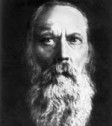Mikhail Saltykov-Shchedrin

Mikhail Yevgrafovich Saltykov-Shchedrin (Russian: Михаи́л Евгра́фович Салтыко́в-Щедри́н, born Saltykov, pseudonym Nikolai Shchedrin; 27 January [O.S. 15 January] 1826 – 10 May [O.S. 28 April] 1889), was a major Russian satirist of the 19th century. He spent most of his life working as a civil servant in various capacities. After the death of poet Nikolay Nekrasov, he acted as editor of the well-known Russian magazine, Otechestvenniye Zapiski, until it was banned by the government in 1884. His best known work is the novel The Golovlyov Family (1876).
Mikhail Saltykov was born on 27 January 1826, in the village of Spas-Ugol, Tver governorate. He was one of eight children (five brothers, three sisters) in the large family of Yevgraf Vasilievich Saltykov, a member of the ancient Saltykov family, and Olga Mikhailovna Zabelina, heir to a rich merchant family. At the time of Mikhail's birth, Yevgraf was fifty years old, and Olga twenty five. Mikhail spent his early years on his parents's large estate in Spasskoye on the border of the Tver and Yaroslavl governorates, in the part of the region known as Poshekhonye.
Life in the Saltykov family was equally difficult. Dominating over the weak, religious father was a despotic mother whose intimidating persona horrified the servants and her own children. This atmosphere was later recreated in the Shchedrin's novel The Golovlyov Family, and the idea of "the devastating effect of legalised slavery upon the human psyche" would become one of the most prominent motifs of Saltykov's prose. Olga Mikhailovna, though, was certainly not without her virtues: a woman of extraordinary intelligence, she had many talents, and, having perceived some in Mikhail, she treated him as her favorite.
The Saltykovs often quarreled; the father, feeling unable to resist his wife's dictatorial inclinations, resorted to verbal rudeness; fearing the former, their children felt no sympathy whatsoever to the latter. The parents gave their children neither love nor care and Mikhail, despite enjoying relative freedom in the house, remembered feeling lonely and neglected. Another thing Saltykov later regretted was his having been completely shut out from nature in his early years: the children lived in the main house and were rarely allowed to go out, knowing their "animals and birds only as boiled and fried." Characteristically, there were few descriptions of nature in the author's works.
 čeština
čeština Deutsch
Deutsch français
français magyar
magyar polski
polski русский
русский English
English Azərbaycan
Azərbaycan беларуская
беларуская italiano
italiano ქართული
ქართული Nederlands
Nederlands português
português slovenčina
slovenčina español
español 中文
中文 қазақ
қазақ







